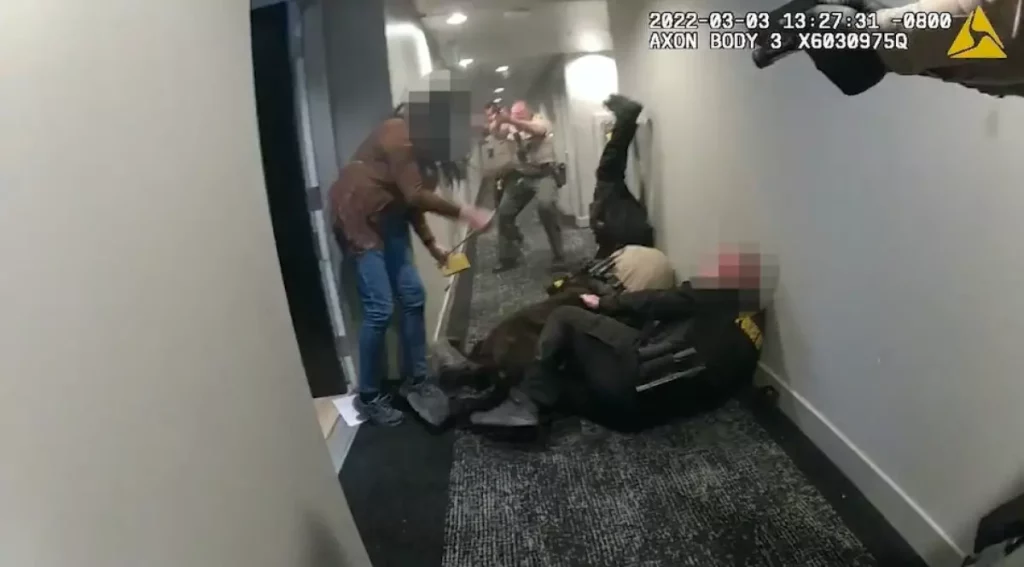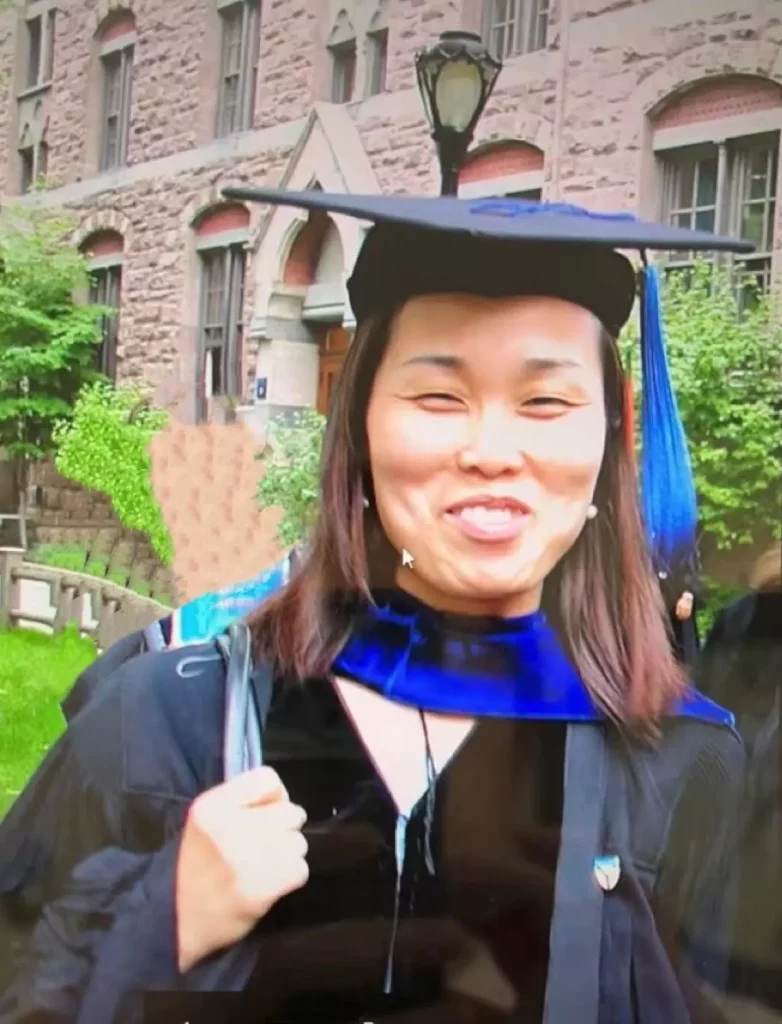San Diego County settles for $825,000 in shooting death of a UCSD scientist
Dr. Yan Li, a Yale-educated scientist was in the grips of a mental health crisis when deputies shot and killed her after she charged them with a kitchen knife.
March 22, 2024
SAN DIEGO — San Diego County paid $825,000 to settle a wrongful death lawsuit filed by the son of a Yale-educated scientist who was shot and killed in March of 2022 by Sheriff’s Deputies as they attempted to serve her with an eviction notice.
CBS 8 obtained the settlement amount through a public records request.
The March 3, 2022 shooting of Dr. Yan Li drew criticism over the deadly use of force on someone who displayed signs of a mental health break and who may have had language barriers with the officers.
In an op-ed in the San Diego Union-Tribune, the dean of Yale School of Public Health criticized deputies for the shooting, stating that deputies knew she was experiencing a mental health episode and should have acted accordingly. The Yale News also wrote about the shooting in their paper.
Li’s son, referred to as “D.S.” in the lawsuit, echoed the Ivy College Dean’s sentiments in his March 2023 wrongful death claim. In the lawsuit, the son pointed to police body cameras that were released after the shooting which showed Li experiencing a mental health break when Sheriff’s Deputies knocked on her door to serve an eviction notice.
WATCH CRITICAL INCIDENT VIDEO RELEASED BY SAN DIEGO COUNTY SHERIFF’S DEPARTMENT |This video contains graphic images, please be advised:
The video, released by the Sheriff’s Department shows Li answering the door while holding a kitchen knife. Moments after she opened the door, Li became angry and questioned whether or not the deputies were in fact law enforcement. Deputies immediately raised their guns. She slammed the door and retreated into a back bedroom. A Sheriff’s Deputy began shouting at Li.
Additional deputies arrived on the scene armed with non-lethal bean bag guns and a Sheriff’s K9.
According to the lawsuit, deputies entered the Little Italy apartment, despite Li not posing a threat to any of the deputies or members of the public, and without help from a mental health expert.
Once inside, deputies fired a bean bag at Li and, according to the lawsuit, “deployed flash-bang rounds against [Li].”
Reads the lawsuit, “The inappropriate beanbag and flash-bang deployment escalated the situation and caused [Li] to move toward the front door to her unit and to exit her unit, into the hallway… Rather than deploying force against [Li], the officers should have summoned mental health assistance for [Li] and ensured that there was appropriate personnel on scene to bridge any obvious language barriers.”
After the altercation inside, Li ran out of the apartment with the knife in her hand. Li stabbed a deputy as deputies fired their guns, killing her.
A spokesperson for the County told CBS 8 that the $825,000 includes attorney’s fees and court costs.
No other statement was provided.
—
San Diego County sued over police shooting death of a scientist during a routine eviction
Dr. Yan Li, a Yale-educated scientist was in the grips of a mental health crisis when deputies shot and killed her after she charged them with a kitchen knife.
March 14, 2023
SAN DIEGO — The son of a Yale-educated scientist who was shot and killed in March of last year by Sheriff’s Deputies as they attempted to serve her with an eviction notice, filed a wrongful death lawsuit against the county and the deputies involved.
The March 3, 2022 shooting of Dr. Yan Li drew criticism over the deadly use of force on someone who displayed signs of a mental health break and who may have had language barriers with the officers. That criticism included an op-ed in the San Diego Union Tribune from the dean of Yale School of Public Health which was submitted less than three weeks after the police shooting. The Yale News also wrote about the shooting in their paper.
According to the lawsuit as well as seen on police body cameras that were released after the shooting, Li was in the midst of a mental health crisis when Sheriff’s Deputies knocked on her door to serve an eviction notice.
Li answered the door holding a small kitchen knife.
WATCH CRITICAL INCIDENT VIDEO RELEASED BY SAN DIEGO COUNTY SHERIFF’S DEPARTMENT |This video contains graphic images, please be advised:
Moments after she opened the door, Li became angry and questioned whether or not the deputies were actually law enforcement. Deputies immediately raised their guns. She slammed the door and retreated into a back bedroom. A Sheriff’s Deputy began shouting at Li.
Additional deputies arrived on the scene armed with non-lethal bean bag guns and a Sheriff’s K9.
According to the lawsuit, deputies entered the Little Italy apartment, despite Li not posing a threat to any of the deputies or members of the public, and without help from a mental health expert.
Once inside, deputies fired a bean bag at Li and, according to the lawsuit, “deployed flash-bang rounds against [Li].”
Reads the lawsuit, “The inappropriate beanbag and flash-bang deployment escalated the situation and caused [Li] to move toward the front door to her unit and to exit her unit, into the hallway… Rather than deploying force against [Li], the officers should have summoned mental health assistance for [Li] and ensured that there was appropriate personnel on scene to bridge any obvious language barriers.”
After the altercation inside, Li ran out of the apartment with the knife in her hand. Li stabbed a deputy as deputies fired their guns, killing her.
The lawsuit, which was filed in federal court, alleges that deputies failed to follow what it calls the most “basic” police training.
“The shooting was an excessive and unreasonable use of force, including because [Li] was not armed with a gun and posed no immediate threat of death or serious bodily injury to any person immediately prior to or at the time of the shots. The shooting and other uses of force against [Li] were inappropriate and violated the officers’ and deputies’ training and basic police training. Officers are required to justify every shot they fire, and here, none of the shots were justified.”
District Attorney Summer Stephan’s Office is currently investigating the shooting.
—
Opinion: Police and deputies shot our colleague in her apartment. She should still be alive today.

We at the Yale School of Public Health were deeply saddened to learn of the March 3 fatal shooting of Dr. Yan Li by a San Diego police officer and several San Diego County sheriff’s deputies.
March 21, 2022
Vermund, M.D., Ph.D., is an epidemiologist and pediatrician serving as dean of the Yale School of Public Health. Desai, Ph.D., is an epidemiologist serving as associate dean for diversity, equity and inclusion. Zhang, Ph.D., is the Susan Dwight Bliss Professor of Biostatistics who co-mentored Dr. Li during her doctoral studies. All three live in Connecticut.
We at the Yale School of Public Health were deeply saddened to learn of the March 3 fatal shooting of Dr. Yan Li by a San Diego police officer and several San Diego County sheriff’s deputies. Dr. Li was a talented scientist who received her doctorate in biostatistics from our school, winning one of our most prestigious student awards. It is heartbreaking to see a colleague’s life end violently in footage from police body cameras. Our hearts go out to everyone scarred by this tragedy, none of whom began their day expecting such trauma. It is wise, then, to seek to learn about the origin of events that led both to the stabbing of a police officer and that cost the life of a 47-year-old scientist and mother of a UC Berkeley student.
Public health focuses on prevention and policy, seeking to improve systems and community and individual health. Social and mental health services can improve health outcomes, and we know that embedding such services into law enforcement has been highly successful in other jurisdictions.
It is evident from our perspective that Dr. Li, facing eviction, was in a state of crisis when she opened her door to a deputy serving the notice. Dr. Li expressed doubt as to the authenticity of the law enforcement officer, opened her door holding a knife, and slammed the door after a brief verbal exchange. The officer responded by swearing and shouting, likely validating, in Dr. Li’s perspective, the threat to her welfare.

(Nianjun Liu )
From the videos made public by the Sheriff’s Department, back-up officers arrived unaccompanied by any mental health professional. The law enforcement personnel returning to the apartment brought a police dog and both non-lethal (a “bean-bag” gun) and lethal weapons. Efforts were made to talk to Dr. Li but without any of the benefit of subtlety or nuance that mental health professionals are trained to deploy. When the officers entered Dr. Li’s home, they did so with a goal of disarming a person they considered a threat to public safety. When Dr. Li chased the officers out of her home and lunged suddenly with a knife, she injured a police officer, and a hail of bullets ended her life.
The circumstances of the killing of Ms. Breonna Taylor two years ago in Louisville, Kentucky, are quite different but involved a home invasion by law enforcement with similarly tragic results. Forcing one’s entry into a residence can be expected to generate fearful responses, as occurred when Ms. Taylor’s boyfriend fired a gun at the plain-clothed intruders.
What is the most productive path forward, seeking to learn from this event? Best practices used in other law enforcement jurisdictions should be studied to see how persons experiencing a crisis can best be engaged with the assistance of trained mental health professionals. Such experts can be embedded within law enforcement personnel, and their deployment can be part of the standard procedures for emergency response when dealing with a potentially disturbed person. This may not work in an acute crisis, but a knife-wielder in her own apartment who is being revisited by law enforcement might have been managed in a non-lethal fashion. We do not know whether this would have been reasonable, so an independent investigation is needed to further illuminate the circumstances around this incident with a goal of developing future preventive strategies.
Officers do not join law enforcement out of desire to serve eviction notices. These interactions are inherently emotionally straining and traumatic. Both those serving and receiving eviction notices would be well-served by the presence of a mental health professional in such trying moments. Furthermore, if law enforcement officers kill someone, we may see a subsequent threat to the well-being and careers of the officers involved. Hence, mental health workers in law enforcement can help avoid or mitigate post-trauma crises that affect citizens and officers alike.
It is worth considering whether Dr. Li’s decision to encounter officers while holding a knife might have been addressed without the use of lethal force. Serving an eviction notice is not the same as an emergent and violent crime. When she was wielding her knife inside her condo, one presumes that a de-escalation protocol with the assistance of a mental health professional working with the officers might have contributed to a salutary outcome.
Dr. Li’s killing suggests to us the need for both better non-lethal crisis intervention training for law enforcement officers and for embedded staff specializing in mental health and social services to assist officers in de-escalating crises and avoiding tragic deaths. We acknowledge the loss and the suffering to all involved.
发表回复